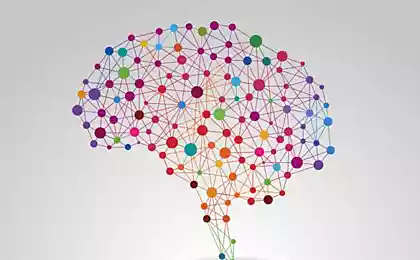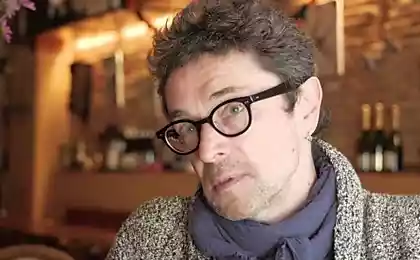535
What is actually the key to longevity?
Many studies show that if you have a mild nature, high intelligence, and successfully found the meaning of life, your chances are cut to commercials in the eighties and to travel to Africa in the ninety-significantly higher than that of your friends whiners.
Forty years ago a respectable nursing home in Connecticut, Arden house, turned into a research base for one of the most inspiring experiments of the twentieth century. Psychologists Judith Rodin and Ellen Langer have checked bold hypothesis: is it true that a sense of control over their lives is crucial to good health and longevity?

"It is important that you have made their lives in Arden house more comfortable, — said the administrator at the General meeting of the inhabitants of the fourth floor. — If you want to rearrange the furniture in your room, inform the staff, they will help you. You can choose house plant, but you will be able to care for it. Thursday and Friday we show a movie, you need to decide whether you want to watch it and on what day".
"We are doing a lot to make your life at Arden house was comfortable, — said the employee of the inhabitants of the second floor. — We furnish your rooms in the best way. In addition, we grant you a plant, you don't need to take care of him, it will water the nurse. Thursday and Friday we show a movie, we will notify you on who on what day will it look".
In addition to these small things, life of older people with the fourth and second floor are almost indistinguishable. What was the astonishment of staff of Arden house, when, after three weeks, researchers have documented important differences between the groups.
People who were encouraged to be in control of my life, began to consider themselves more active and happy.
Those who did not had to solve any problems, because any second now came to the aid of a dedicated staff, by contrast, are more passive and unhappy.
Questionnaires filled out by nurses (different on each floor and not aware of the essence of the experiment) showed that the residents of the fourth floor improved health, and yet they, unlike the residents of the second floor, began to devote more time to fellowship with neighbors, family and friends.
Eighteen months into the experiment, the health status deteriorated in both groups — after all we are talking about the deep elderly. However, during that time died of old age 13 of 44 residents of the second floor and 7 of the 47 residents the fourth.
The authors evaluated this result as statistically significant, and even expressed it in percent, from which the film was even more impressive: 15% mortality among those who control their lives and 30% among those who had no control over it.
So, if we just have the flower, for whom he cares, the fact it twice reduces the probability of dying in the next year and a half. How strong must be the effect for the elderly, heavily immersed in interesting work?
Willpower – the key to longevity?
In 1800 the average life expectancy in rich countries was 40 years, and in the poor – only 25. Few managed to live to old age, most people died from infections. Today, people in developed countries live on average 80 years, and in the third world – 50. At the same time, if you look at the leading causes of death, it appears that in the third world people still die from diarrhea, respiratory infections, AIDS. In developed countries where modern medicines, all of these problems can be kept under control. People die from stroke, coronary heart disease, lung cancer, diseases whose development is heavily dependent on lifestyle. Researchers call the current situation a "third epidemiological revolution".
During the first epidemiological revolution, doctors have learned to deal with infections, second allowed to retain control of chronic diseases such as diabetes. The main task today – to deal with senile disease, and there the rescue of drowning to a great extent depend on themselves. Long live those who have the willpower to quit Smoking, do not abuse high-calorie food and go ride my bike instead of watching TV, lying on the couch.

In search of Ekiga
Researchers looking for a link between longevity and psychological well-being, often used in his works the Japanese concept of "ikigai". He has no common translation into Russian or English. Ikigai is both a "meaning of life" and "purpose of life", and "what man in the morning gets out of bed". If you use metaphors from Western culture, that ikigai is what you mention in conversation with Saint Peter, to show him that you have wisely ordered your destiny and you can safely pass to Paradise.
The conversation at the pearly gates, however, will not be soon. In 2008, a group of Japanese scientists published the results of seven studies, which involved more than 40 thousand elderly people. All subjects were asked whether their life ikigai. 25 596 people said "Yes". The rest were unsure or acknowledged that cigem they still have not got.
It was found that among those who have no sense of life during the follow-up died one and a half times more people than among those with the meaning of life was. Especially high was the risk of death from cardiovascular disease, pneumonia, as well as from external causes, including suicide.
The authors note that, among people deprived of Ekiga, from the very beginning was a higher proportion of unemployed, unmarried, poorly educated and inactive, but the pattern persisted even when comparing people with the same social status and lifestyle.

If only there was no war
In 1932 in Scotland carried out a large-scale study of the IQ level of local schoolchildren. The results preserved in the archives, and in 2001 scientists were able to find 2230 participants in this survey, to see how was their fate. It was found that every extra 15 IQ points to 21% increase the chance of a person to stay alive for 76 years.
The effect was stronger for women than for men, but the authors note that this is likely due to the influence of the Second world war, where the chances of dying were higher for those who in childhood showed a high level of intelligence.
Also interesting: Catherine the Malabe: old age — an event that occurs instantly
The lessons of beautiful aging: how to live French women after 50
Why smart people live longer? On the one hand, they tend to take care of your health is more successful in quitting Smoking, don't abuse alcohol, less likely to get injured than people with a low IQ. On the other hand, we can talk about what smart students from the study in 1932 from the beginning inherited from their parents a more favorable combination of genes, and the better nourished in childhood – that also led to the development of intelligence, and better health throughout life.published
Author: Asya Kazantseva
P. S. And remember, only by changing their consumption — together we change the world! ©
Source: nauchkor.ru/media/dolgaya-schastlivaya-zhizn-576f8af65f1be7241d905772
Forty years ago a respectable nursing home in Connecticut, Arden house, turned into a research base for one of the most inspiring experiments of the twentieth century. Psychologists Judith Rodin and Ellen Langer have checked bold hypothesis: is it true that a sense of control over their lives is crucial to good health and longevity?

"It is important that you have made their lives in Arden house more comfortable, — said the administrator at the General meeting of the inhabitants of the fourth floor. — If you want to rearrange the furniture in your room, inform the staff, they will help you. You can choose house plant, but you will be able to care for it. Thursday and Friday we show a movie, you need to decide whether you want to watch it and on what day".
"We are doing a lot to make your life at Arden house was comfortable, — said the employee of the inhabitants of the second floor. — We furnish your rooms in the best way. In addition, we grant you a plant, you don't need to take care of him, it will water the nurse. Thursday and Friday we show a movie, we will notify you on who on what day will it look".
In addition to these small things, life of older people with the fourth and second floor are almost indistinguishable. What was the astonishment of staff of Arden house, when, after three weeks, researchers have documented important differences between the groups.
People who were encouraged to be in control of my life, began to consider themselves more active and happy.
Those who did not had to solve any problems, because any second now came to the aid of a dedicated staff, by contrast, are more passive and unhappy.
Questionnaires filled out by nurses (different on each floor and not aware of the essence of the experiment) showed that the residents of the fourth floor improved health, and yet they, unlike the residents of the second floor, began to devote more time to fellowship with neighbors, family and friends.
Eighteen months into the experiment, the health status deteriorated in both groups — after all we are talking about the deep elderly. However, during that time died of old age 13 of 44 residents of the second floor and 7 of the 47 residents the fourth.
The authors evaluated this result as statistically significant, and even expressed it in percent, from which the film was even more impressive: 15% mortality among those who control their lives and 30% among those who had no control over it.
So, if we just have the flower, for whom he cares, the fact it twice reduces the probability of dying in the next year and a half. How strong must be the effect for the elderly, heavily immersed in interesting work?
Willpower – the key to longevity?
In 1800 the average life expectancy in rich countries was 40 years, and in the poor – only 25. Few managed to live to old age, most people died from infections. Today, people in developed countries live on average 80 years, and in the third world – 50. At the same time, if you look at the leading causes of death, it appears that in the third world people still die from diarrhea, respiratory infections, AIDS. In developed countries where modern medicines, all of these problems can be kept under control. People die from stroke, coronary heart disease, lung cancer, diseases whose development is heavily dependent on lifestyle. Researchers call the current situation a "third epidemiological revolution".
During the first epidemiological revolution, doctors have learned to deal with infections, second allowed to retain control of chronic diseases such as diabetes. The main task today – to deal with senile disease, and there the rescue of drowning to a great extent depend on themselves. Long live those who have the willpower to quit Smoking, do not abuse high-calorie food and go ride my bike instead of watching TV, lying on the couch.

In search of Ekiga
Researchers looking for a link between longevity and psychological well-being, often used in his works the Japanese concept of "ikigai". He has no common translation into Russian or English. Ikigai is both a "meaning of life" and "purpose of life", and "what man in the morning gets out of bed". If you use metaphors from Western culture, that ikigai is what you mention in conversation with Saint Peter, to show him that you have wisely ordered your destiny and you can safely pass to Paradise.
The conversation at the pearly gates, however, will not be soon. In 2008, a group of Japanese scientists published the results of seven studies, which involved more than 40 thousand elderly people. All subjects were asked whether their life ikigai. 25 596 people said "Yes". The rest were unsure or acknowledged that cigem they still have not got.
It was found that among those who have no sense of life during the follow-up died one and a half times more people than among those with the meaning of life was. Especially high was the risk of death from cardiovascular disease, pneumonia, as well as from external causes, including suicide.
The authors note that, among people deprived of Ekiga, from the very beginning was a higher proportion of unemployed, unmarried, poorly educated and inactive, but the pattern persisted even when comparing people with the same social status and lifestyle.

If only there was no war
In 1932 in Scotland carried out a large-scale study of the IQ level of local schoolchildren. The results preserved in the archives, and in 2001 scientists were able to find 2230 participants in this survey, to see how was their fate. It was found that every extra 15 IQ points to 21% increase the chance of a person to stay alive for 76 years.
The effect was stronger for women than for men, but the authors note that this is likely due to the influence of the Second world war, where the chances of dying were higher for those who in childhood showed a high level of intelligence.
Also interesting: Catherine the Malabe: old age — an event that occurs instantly
The lessons of beautiful aging: how to live French women after 50
Why smart people live longer? On the one hand, they tend to take care of your health is more successful in quitting Smoking, don't abuse alcohol, less likely to get injured than people with a low IQ. On the other hand, we can talk about what smart students from the study in 1932 from the beginning inherited from their parents a more favorable combination of genes, and the better nourished in childhood – that also led to the development of intelligence, and better health throughout life.published
Author: Asya Kazantseva
P. S. And remember, only by changing their consumption — together we change the world! ©
Source: nauchkor.ru/media/dolgaya-schastlivaya-zhizn-576f8af65f1be7241d905772
Aidar Farrakhov: What gives the child the camp, but could not give the school
Station for biological treatment of sewage in the country























